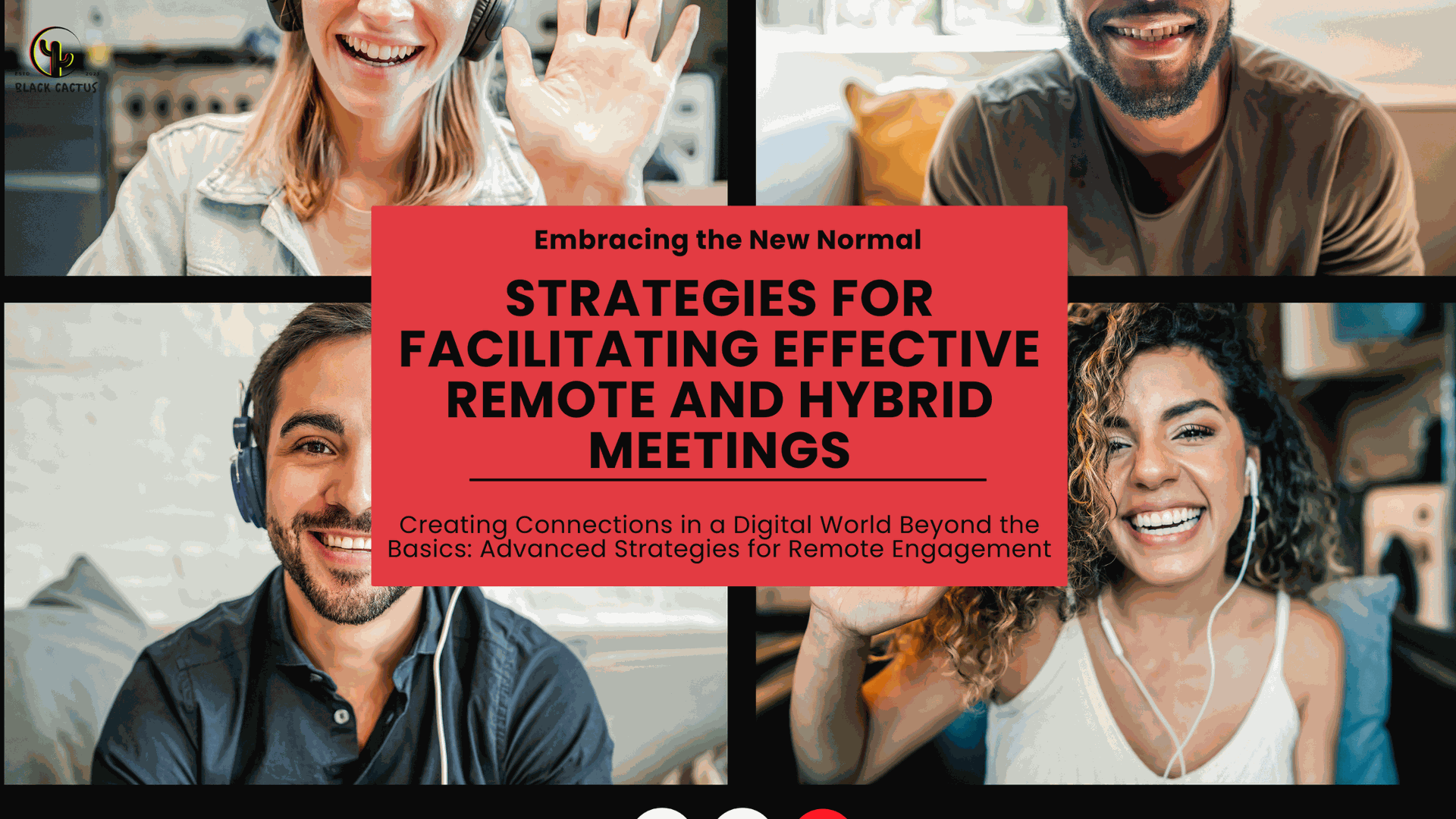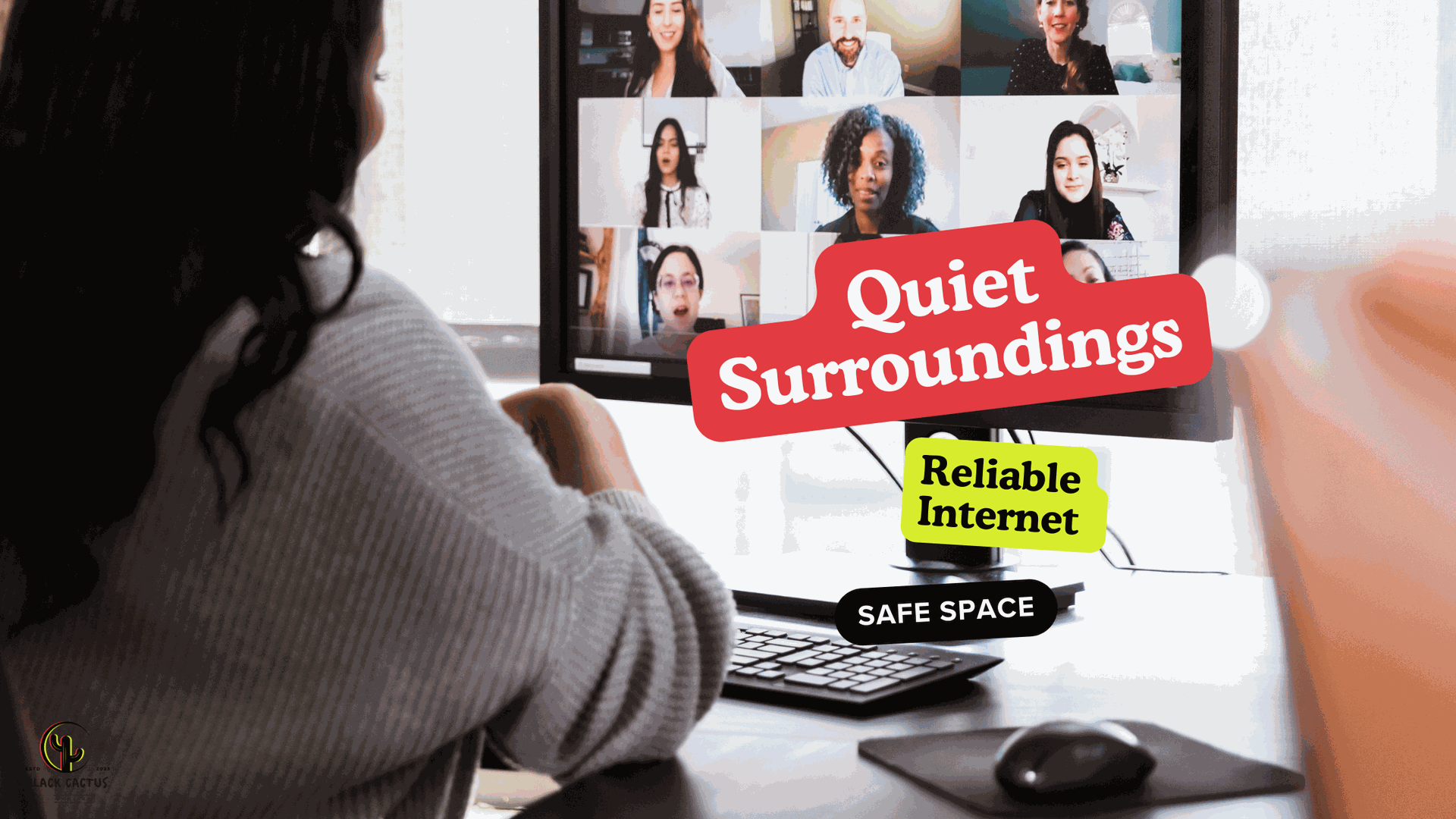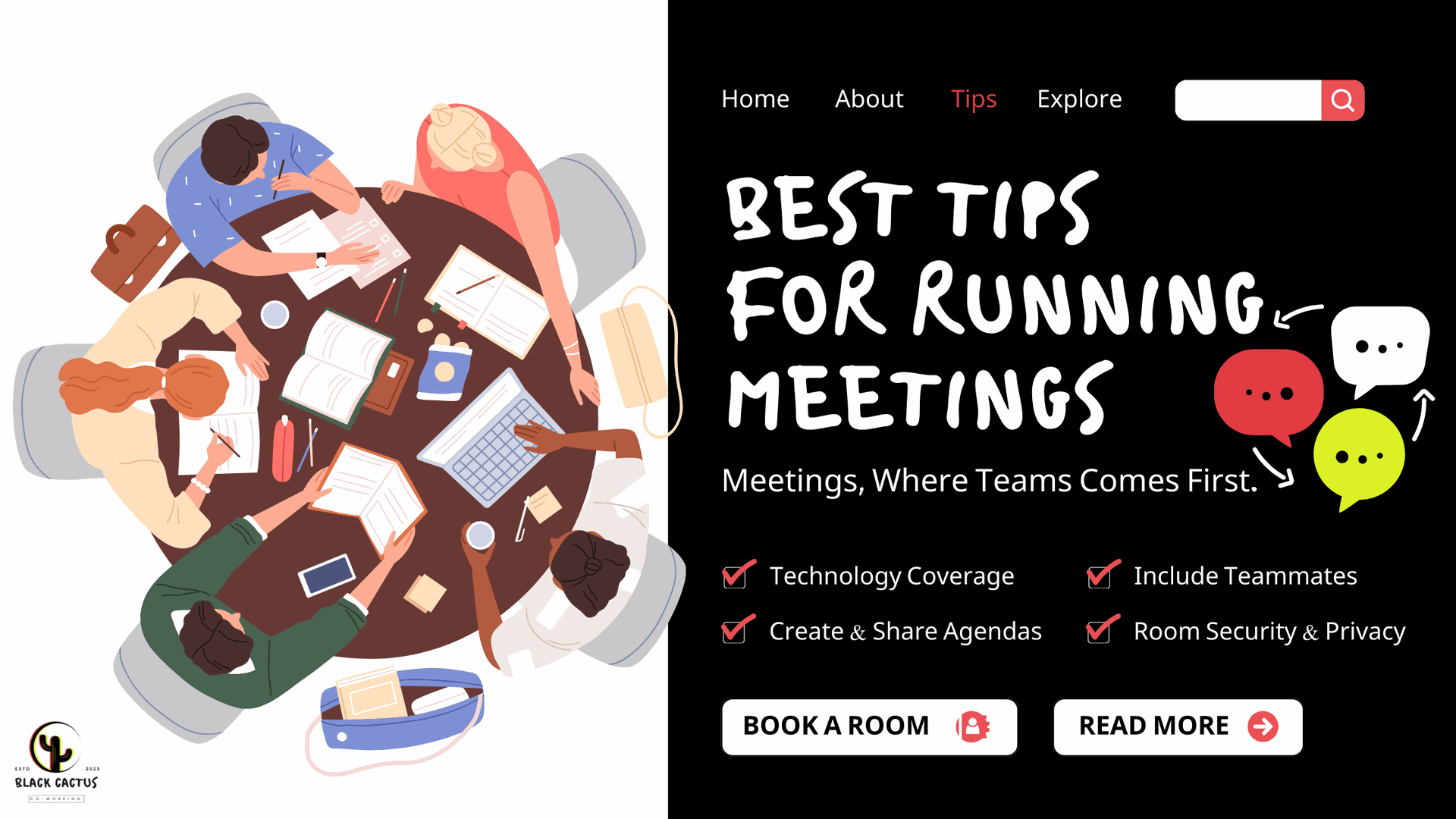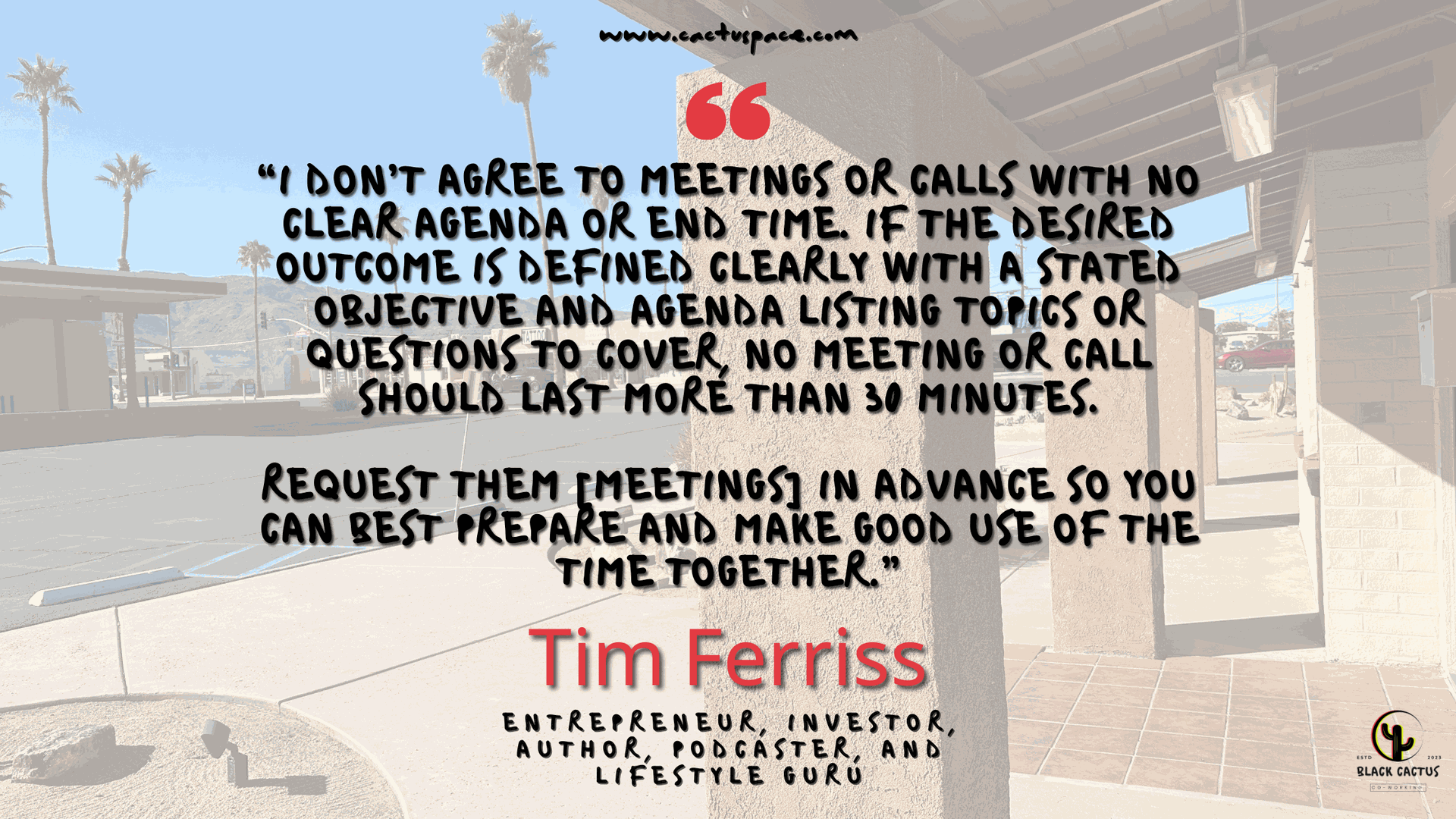
Need Help Running Better Meetings?
This Post Offers Several Tips Designed to Help Increase Productivity and Efficiency for In Person, Hybrid and Online Meetings
In today's evolving digital first, work environment, remote and hybrid meetings have become important. Meetings, whether they take place online, person, over the phone, or in a hybrid format, require thoughtful planning and procedures to ensure they're worth the effort.
Yet, we've all faced dreaded calendar reminders for a meeting we believe is a waste of time. But the research shows that run conducted effectively, meetings offer a great opportunity to build teams, solve problems, and deliver successful outcomes for internal and external customers alike.
In this post, Black Cactus Co-Working explores the unique challenges and opportunities to improving team meeting quality.
The Challenges and Science Behind Remote Video Meetings
Research from Yale and other institutions has shed light on the psychological and neurological challenges of remote meetings.
We delve into how these findings can help improve your meeting strategies, whether you're dialing in from home, a café, or a local coworking space.
Research from Yale University, as reported by ScienceAlert, reveals that the human brain processes Zoom conversations differently than face-to-face interactions.
The study involved 28 healthy adults and utilized functional near-infrared spectroscopy (fNIRS), electroencephalography (EEG), and eye trackers to record brain and eye activity during conversations. Key findings include:
- Brain Activity Differences: Face-to-face interactions resulted in greater brain signaling in the dorsal-parietal region, indicating more engagement during in-person conversations compared to Zoom calls.
- Theta Oscillations: These oscillations, linked to better face processing, were more pronounced in face-to-face discussions, suggesting enhanced sensory processing and spatial perception.
- Pupil Diameters and Synchronization: In-person interactions showed larger pupil diameters, suggesting increased arousal. Additionally, higher levels of synchronized neural activity were observed, indicative of a more robust exchange of social cues.
- Technological Limitations: The study notes that technological limitations, such as difficulty in making eye contact via webcams, contribute to the less effective social communication system observed in Zoom calls compared to in-person interactions.
These findings underscore the importance of understanding and adapting to the unique challenges of remote and hybrid meetings, which this blog post addresses with practical strategies.

Strategies for Effective Meetings in Shared Spaces
Effective meetings require more than just good WiFi. In this section,. we share strategies for navigating shared facilities and maintaining privacy in a coworking setting.
Tips in this section will include finding quiet corners, using technology to your advantage, and embracing specially designed spaces for privacy and focus.
In order to help explore our thinking, we summarize two articles, one from MIT, and the second a 2021 research report conducted by Katherine A. Karl, Joy V. Peluchette, and Navid Aghakhani.
The Surprising Science Behind Successful Remote Meetings (MIT Sloan Management Review)
This May, 2020 article, written by Steven G. Rogelberg takes about 6-minutes to read, and provides research-based insights to improve remote meetings and keep participants engaged.
Key Points:
- Negative Impact of Poor Meetings: Ineffective meetings can have a significant negative impact on team success, innovation, creativity, and individual well-being. Poor meetings can lead to a syndrome where employees lose additional time and productivity recovering from them.
- Effectiveness of Meetings: Only about 50% of meeting time is effective, engaging, and well-used. This effectiveness drops even lower in remote meetings. However, well-run meetings can lead to positive outcomes like better decision-making and increased innovation.
- Evidence-Based Path Forward: Over 20 years of meeting science research provides insights beneficial for meeting leaders, especially in the context of remote meetings.
- Stewardship Mindset: Successful remote meetings involve adopting a stewardship mindset, being deliberate in meeting decisions from start to finish, including setup, management, and conclusion.
- Practical Meeting Tips: Recommendations for effective remote meetings include not over-inviting participants, reducing meeting length to create positive pressure, sharpening the agenda, using video to counteract social loafing, starting and ending on time, establishing norms, and utilizing technological tools like polling and chat functions.
- Black Cactus' Analysis: Our thought process is the kindest action business leaders can take when scheduling time to meet with internal team mates, or external customers, vendors, or partners. Simple action items including: creating agendas, emails which help prepare people for the meeting, opportunities for feedback, using surveys to collect data, and post meeting follow ups. Using the chat is also a great opportunity to keep teammates engaged. We also recommend recording meetings and distributing for teammates later should something get missed.

Virtual Work Meetings During the COVID-19 Pandemic: The Good, Bad, and Ugly (Sage Journals)
Key Points:
- Rise in Videoconferencing Use: The pandemic led to a significant increase in videoconferencing for work meetings, with platforms like Zoom, Google Meet, and Microsoft Teams experiencing a surge in users. This trend is expected to continue
- Challenges of Videoconferencing: Users reported Zoom fatigue and challenges like prolonged direct eye gaze, information overload, and self-consciousness due to seeing themselves on screen.
- Study Objectives: The study aimed to understand the effectiveness, frustrations, and unique challenges of using videoconferencing for work meetings, applying media naturalness theory and meeting science.
- Participant Engagement and Multitasking: Participants were less motivated to engage in remote meetings and more likely to multitask, especially during larger or less relevant meetings.
- Positive and Negative Effects of Videoconferencing: Research found both positive and negative aspects of videoconferencing, such as social affordances and challenges like Zoom fatigue and role conflict.
- Frustrations with Technology and Behavior: Frustrations related to how others used technology, camera issues, microphone problems, and the impact of work-from-home environments on meetings were highlighted.
- Training and Etiquette for Effective Virtual Meetings: Recommendations include training employees on videoconferencing etiquette, camera/screen positioning, and meeting structure. Concerns about overusing videoconferencing and alternatives like emails or messaging systems were also discussed.
- Future Research Directions: The study acknowledged limitations and suggested future research directions to understand better the satisfaction, engagement, and effectiveness of videoconferencing.

By understanding and analyzing the Qualitative and Quantitative Data found in both posts, or the statistics and stories which represent the spirit of this post, we hope you take the time to consider ways to empower you, your team, or your organization based on the provided examples.
Stories Regarding Meetings:
- There is a negative psychological and productivity impacts of poor meetings.
- The Stewardship mindset and deliberate meeting decisions improve meetings
- Practical tips for effective remote meetings are unique
- Remain mindful of participant engagement and multitasking behavior.
- There are both positive and negative effects of videoconferencing technology.
- Sensitivity to technology and behavior-related frustrations impact meetings
- Recommendations for training and meeting etiquette are imperative
Important Numbers to Consider:
- We've seen an increase from 10 million to 300 million Zoom users from December 2019 to April 2020.
- 30% of meetings involving email multitasking; 36% reported negative outcomes of multitasking.
- Over 60% of comments focused on camera and microphone issues.
The Neuroscience of Remote Work (Psychology Today)
Summary: This article delves into the challenges of building and sustaining relationships in remote work environments.
It focuses on the role of "mirror neurons," which are less activated in online interactions, affecting our ability to connect authentically with remote team members.
The article suggests ways to overcome these limitations by acknowledging the challenges and adapting communication strategies.
Important Stories from the Post:
- Remote work poses significant challenges in building and maintaining relationships, particularly with new team members.
- Online platforms like Zoom and Slack limit the activation of mirror neurons, essential for empathy and relationship building.
- Strategies to overcome remote work challenges include acknowledging differences, celebrating successes, and enhancing focus during online interactions.
Critical Research:
- A 2017 study found that over half of remote workers felt their colleagues did not treat them equally, viewing them as mere task-doers rather than unique individuals.

Building and Sustaining Relationships Remotely
Creating a sense of connection and community is crucial, even more so in a shared coworking environment.
We explore how to foster robust team dynamics and meaningful interactions, regardless of physical location.
The Neuroscience of Trust (Psychology Today)
Summary: This article discusses how our brains are hardwired to trust others and the impact of betrayal on our neurobiology. A study illustrates the mechanisms underlying the social value and importance of trust, showing how participants trusted "close friends" more, activating specific brain regions like the "ventral striatum" and "medial prefrontal cortex," even when the reciprocity was controlled to be the same as with strangers.
Important Stories Found in the Post:
- Our brains are naturally inclined to trust others, and betrayal can short-circuit this neurobiology.
- The study's participants reported more rewarding interactions with "close friends" than with strangers or a computerized slot machine.
- Feelings of trust occurred despite actual reciprocity being the same across all players, illustrating the power of perceived social connections.
- Trust, while a natural instinct, should be balanced with skepticism to avoid blind trust, which can be exploited.

Be Part of the Innovation
Join us in redefining remote and hybrid meetings. Reserve our technology enabled conference room and discover how you can transform your meetings, regardless of where you conduct them.
Our goal at Black Cactus is to empower you with the knowledge and skills to conduct effective remote and hybrid meetings, whether at our coworking space or beyond. We understand the nuances of shared environments and are committed to providing solutions that respect privacy and enhance collaboration.
If you have any questions, feedback or ideas for consideration, feel free to use the form below.

